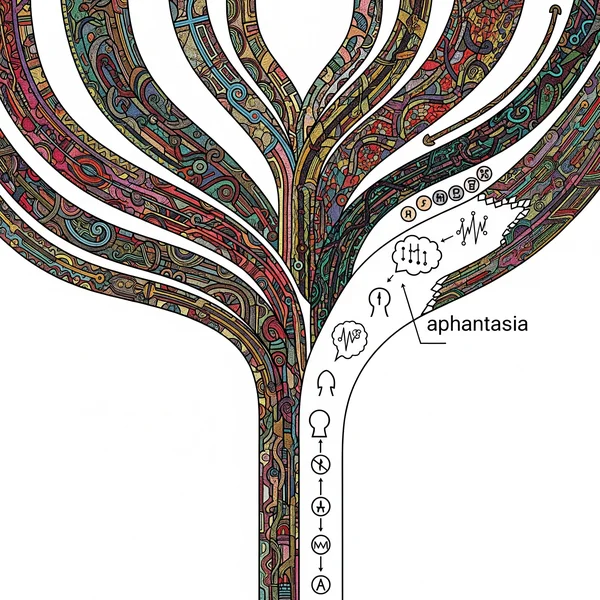What is Aphantasia? Mind's Blank Canvas Explained
Have you ever tried to picture a loved one's face or a serene beach in your mind's eye, only to find... nothing? You're not alone. Many people wonder, "What does aphantasia mean?" This guide delves into the topic of aphantasia, exploring this fascinating cognitive variation where individuals experience a lack of voluntary mental imagery. If you're curious about your own ability to visualize, or if you suspect you might have this trait, you can discover more by exploring our aphantasia resources.
Decoding Aphantasia: A Comprehensive Guide
Aphantasia, a term coined in 2015 by Professor Adam Zeman, describes a condition where individuals are unable to voluntarily create mental pictures in their mind. It's not about a lack of creativity or intelligence; it's simply a different way of experiencing thought. Understanding the signs can be the first step towards self-awareness.
What is the Definition of Aphantasia?
So, what exactly is the aphantasia definition? It refers to the reduced or absent ability to form voluntary mental pictures. While some colloquially call it "mind blindness," this term can be a bit misleading. It's not blindness in the traditional sense, but rather an inability to consciously conjure visual scenes internally.

The Origin of the Term "Aphantasia"
The term "aphantasia" comes from the Greek words "a" (without) and "phantasia" (imagination or appearance). Professor Zeman and his team at the University of Exeter introduced it to describe this specific lack of visual thinking ability, following studies on individuals who lost their ability to visualize after brain injury, and then extending to those who reported never having it.
A Spectrum, Not a Binary Condition
It's important to understand that aphantasia exists on a spectrum. Some individuals might have absolutely no internally generated visuals, while others might experience very dim, fleeting, or non-detailed images (sometimes referred to as hypophantasia). The vividness of mental imagery varies greatly among the general population.
Understanding the Term "Mind Blindness"
While "mind blindness" is a catchy phrase, it doesn't fully capture the nuance of aphantasia. Many with aphantasia can still recall facts, understand spatial relationships, and lead full, creative lives without an internal visual canvas. Their way of processing information simply operates differently.
What Are the Common Signs of Aphantasia?
How do you know if you might have aphantasia? Recognizing the common aphantasia symptoms or characteristics is key. Common experiences include:

Difficulty with Voluntary Visualization
The primary characteristic is the inability to visualize voluntarily. If someone asks you to picture an apple, you might know what an apple looks like (its color, shape, texture) but you don't see it in your mind's eye.
Impact on Recalling Visual Memories
Recalling memories might be different. Instead of replaying a visual scene from the past, individuals with aphantasia might remember facts, events, and emotions associated with the memory, but without the accompanying mental pictures. This visual imagery deficit primarily affects the re-experiencing aspect of episodic memory.
Potential Differences in Dreaming
Dreaming experiences can vary. Some people with aphantasia report having visual dreams, while others do not, or their dreams are more conceptual or sensory. This is an area still being explored by researchers in neuroscience and psychology.
How Common is Aphantasia?
How common is aphantasia? It's more common than you might think. While exact figures are still being researched, aphantasia is not exceedingly rare.
Current Estimates on Prevalence
Current research suggests that aphantasia affects a small but significant percentage of the population. Estimates for complete aphantasia (total lack of visual imagery) range from 1-4%. If you include those with significantly reduced imagery (hypophantasia), the overall aphantasia prevalence could be higher.
The Role of Growing Awareness and Research
As awareness grows, more people are identifying with aphantasia and seeking information. This has spurred more research into its cognitive underpinnings and its impact on daily life. If you're curious about your own experience, you might consider an online aphantasia assessment.
Aphantasia vs. Typical Visual Imagery: What's the Difference?
Understanding the difference between having aphantasia and having typical (or even vivid) mental imagery is crucial. How does aphantasia differ from simply having a "bad imagination"?
The Experience of "Seeing" in the Mind's Eye
For many, visualizing involves "seeing" images internally, almost like a faint movie playing behind their eyelids. This internal screen can be used to recall memories, imagine future scenarios, or visualize concepts.
How Aphantasics Describe Mental "Images"
Individuals with aphantasia often describe "thinking" about things in a more conceptual, verbal, or factual way. They "know" what something looks like but don't have the subjective experience of seeing it. This is a key aspect of the experienced visual imagery deficit.
How to Know If You Have Aphantasia: The VVIQ Test
How do I know if I have aphantasia? Self-reflection is a starting point, but a more structured aphantasia test can provide clearer insights.

Self-Observation: Your Internal Experience
Pay attention to your internal experiences when you try to remember a face, a place, or imagine something new. Do you see an image, or do you just "know" the details? This self-assessment can be enlightening.
Introduction to the VVIQ Test
The Vividness of Visual Imagery Questionnaire (VVIQ) is a scientifically validated tool used in psychological research to measure the vividness of mental imagery. It asks you to rate how vividly you can picture various scenarios. Our platform, aphantasiatest.com, offers a version of this classic VVIQ assessment.
Why a Standardized Aphantasia Test Matters
While informal tests exist, a scientifically designed aphantasia test like the VVIQ provides a more standardized and reliable way to understand your visual imagery capabilities. It helps to place your experience on the spectrum from aphantasia to hyperphantasia (exceptionally vivid imagery).
Embracing Your Unique Cognitive Style
Understanding what is aphantasia is about recognizing a natural variation in human cognition, not a disorder. Whether you have vivid imagery, none at all, or somewhere in between, your way of thinking is unique and valid. If this exploration has piqued your curiosity, we encourage you to learn more about your mind's eye by visiting our site and perhaps try our VVIQ-based aphantasia test.
Frequently Asked Questions About Aphantasia
Can aphantasia be developed or cured?
Currently, aphantasia is understood as a cognitive variation, not a disease to be cured. For most, it seems to be a lifelong trait (congenital aphantasia), though some may acquire it after brain injury. There's ongoing research, but no established "cures."
Is aphantasia a learning disability or a mental illness?
No, aphantasia is not classified as a learning disability or a mental illness. It is a difference in how some individuals process information. While it might present unique approaches to learning or memory, it doesn't inherently imply a deficit in overall cognitive ability. Many successful individuals across various fields have aphantasia.
How does aphantasia differ from a "bad imagination"?
"Bad imagination" is a subjective term. Aphantasia specifically refers to the lack of voluntary mental imagery. Someone with aphantasia can still be highly creative, solve complex problems, and have a rich inner life; they just don't "see" images in their mind when doing so. If you're unsure, taking a well-regarded assessment like the VVIQ, which you can find on our platform, can offer clarity.
What are the first steps if I suspect I have aphantasia?
If you suspect you have aphantasia, the first step is self-reflection and learning more about it. Reading articles like this one is a good start. For a more structured understanding of your own visual imagery, consider taking a scientifically-backed assessment. You can try our VVIQ aphantasia test here to gain insights.